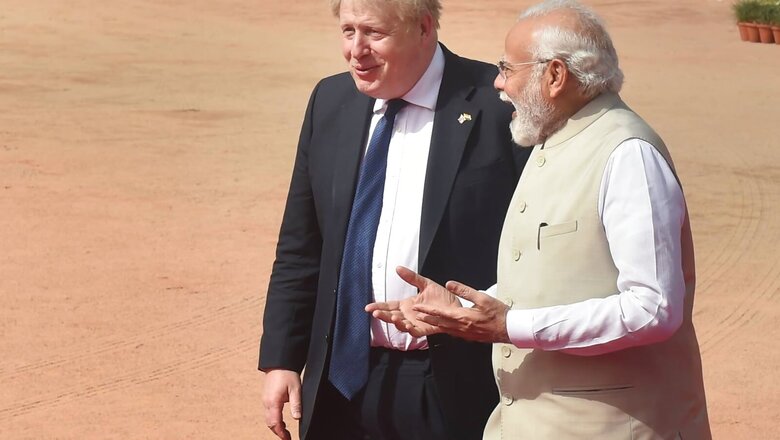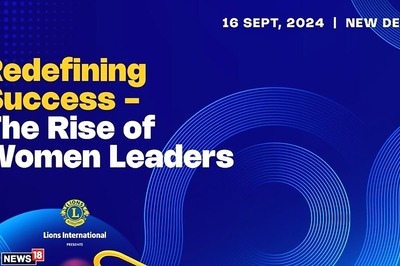
views
The twice postponed much awaited visit of Prime Minister Boris Johnson has served the purpose of giving the necessary additional push to implement the 10-year India-UK roadmap to transform the relationship and take it to another level by 2030. Prime Minister Narendra Modi and Johnson are both committed to the relationship, with the Indian side persuaded at the political level that the UK Prime Minister wishes to drive it forward and galvanise the British bureaucracy to follow his lead. The two Prime Ministers have been in touch, contacts at the Foreign Minister level have been frequent, the trade negotiators have been hard at work and have registered progress.
In May 2021, following their Virtual Summit, the two leaders had agreed to elevate India-UK relations to a Comprehensive Strategic Partnership. This implies cooperation in a range of strategic areas, including strategic political choices in our region to begin with but extending beyond to also cover larger cross-cutting international issues relating to global security, technology, cyberspace, climate change, trade, health, and so on.
On the face of it, there are gaps that need to be filled to give real substance to this Comprehensive Strategic Partnership. UK policies in our region relating to Pakistan and Afghanistan have a tilt against our interests. Political circles in the UK target India on humanitarian and minority issues. Pro-Khalistani and anti-Indian ISI supported Kashmiri groups operate in the UK with some complaisance on the part of UK authorities despite India’s protests.
During Johnson’s visit both leaders reviewed the progress made in the ambitious ‘Roadmap 2030’ and set some goals for the future, namely, steering “bilateral relations towards a Vision 2047 for shared security and prosperity of their people and the planet”, which is rather hyperbolic. (2047 will be the 100th anniversary of India’s independence). Modi has recognised that good progress has been made in the negotiations for a Free Trade Agreement and has called for full efforts to conclude it by the end of the year, or by Diwali, as Johnson has artfully said to the press.
The Joint Statement acknowledges the increasing investment flows between the two countries and the successful India-UK collaborations between GIFT City and the UK’s financial services ecosystem. Modi has welcomed UK’s commitment to channel $1 billion of investment into climate related projects in India over the period of 2022-2026, as well as the UK’s guarantee for $ 1 billion World Bank lending to support India to develop green infrastructure.
As part of a broadening partnership, the implementation arrangements of the India-UK Global Innovation Partnership (GIP) in the field of trilateral development cooperation have been finalised. India and the UK will co-finance up to $100 million over 14 years to support the transfer and scale up of climate-smart inclusive innovations from India to third countries in Asia, Africa and the Indo-Pacific. This, Modi believes, will be useful for our start-ups and MSME sector in exploring new markets, and in making their innovations global.
India and Britain have had productive defence ties in the past, but Britain has lost ground to the US, Israel and France in recent years, not to mention Russia. In the context of the ‘Road Map 2030’, heightened defence and security cooperation is envisaged. Modi has noted that the UK is offering support for Atmanirbhar Bharat in all sectors of manufacturing, technology, design and development in defence. The establishment of the Strategic Tech Dialogue between the two countries has been welcomed by him.
It would seem that the UK, seeing the mounting security challenges ahead and the rise in defence budgets in several countries, is open to robust defence industrial collaboration for manufacturing of defence equipment, systems, spare parts, components, aggregates under the Make in India programme through co-development, indigenisation, transfer of technology and setting up of joint ventures for meeting India’s needs and those of other countries. This will be essentially done collaboratively with the private sector. The Adani group has, for one , shown interest following Johnson’s visit to Gujarat. How this would shape up remains to be seen. In the case of the US, we have seen how the DTTI has failed to produce tangible results.
Strategic collaboration including Modern Fighter Aircraft and Jet Engine Advanced Core Technology figures in the Joint Statement, which if it happens would be a vital advance, though, as we have seen, the jet engine technology, a highly prized one, did initially figure in discussions under the DTTI but reached nowhere. France has already offered cooperation with India on developing the engine for our advanced LCA. Both sides have agreed to work with key partner countries (read the US with which the UK will consult so as not to duplicate efforts) to facilitate highest level access to technology to Indian industry.
PM Modi has welcomed the UK announcement of an ‘open general export licence’, highlighted by Johnson during his visit, to facilitate technology engagement with India, and the open opportunity for India to participate in the UK’s aviation and naval shipbuilding programmes. In the maritime domain, an early conclusion of the Maritime Information Exchange Arrangement on dark and grey shipping finds mention. Johnson has highlighted partnering on maritime technologies to detect and respond to threats in the oceans. The Defence Ministerial Dialogue will be convened this year to ensure that all the necessary framework agreements are in place.
A Letter of Arrangement has been finalised between the UK’s Defence Science & Technology Laboratory and India’s DRDO to boost advanced security capabilities through joint-research, co-design, co-development and joint production of defence technology and systems, particularly in key and emerging military technologies. This is important as until recently the UK has been reluctant to give access to its defence laboratories to the DRDO. A Joint Working Group on India-UK Electric Propulsion Capability Partnership has been set up with the goal of fostering military and industrial collaboration in maritime Electric Propulsion systems.
Cybersecurity has become a major area of shared concerns with the UK and others. Progress has been made under the enhanced the India-UK cyber security partnership to tackle shared cyber threats, including critical national infrastructure. A Joint Cyber Statement to deepen cooperation across cyber governance, deterrence and strengthening cyber resilience gas been issued during Johnson’s visit.
On climate and clean energy, which are key areas of India-UK exchanges, Modi and Johnson have agreed to advance efforts to identify concrete projects for early operationalisation of the global Green Grids Initiative — One Sun One World One Grid. They appreciated the ongoing cooperation on the development and deployment of affordable green hydrogen for both countries, including through the India-UK Science and Innovation Partnership on Green Hydrogen and joint work on a Green Hydrogen Hub. India has invited the UK to join India’s National Hydrogen Mission.
Health has been identified as an area of fruitful cooperation. A Ministerial Dialogue on Health will be convened later in the year to agree an India-UK Action Plan on Health and Life Sciences and enhance collaboration in the fields of vaccines, diagnostics and therapeutics, pandemic preparedness, digital health, anti-microbial resistance, and health worker mobility.
The UK has been vocal and aggressive against Russia on the Ukraine issue, and it was expected that Johnson will use his visit to pressure India to align its position more closely with that of the West. A UK spokesperson said in advance of the visit that Johnson will not “lecture” India on Ukraine (an unfortunate choice of words) but will give his perspective and hear that of India. In the event, unlike during the visit of Foreign Secretary Liz Truss, the diplomatic temperature on Russia was kept under control privately and publicly, though Johnson erred in his press briefing by putting words in Modi’s mouth rather cavalierly to the effect that the Indian PM had asked Russian President Vladimir Putin on Ukraine “what on earth he thinks he is doing and where he thinks he is going”, which are words that befit Johnson’s style, not Modi’s.
The Joint Statement largely reproduces the language on Ukraine that figures in the India-US 2+2 Dialogue communiqué, expressing “in the strongest terms the concern of the two leaders about the ongoing conflict and humanitarian situation in Ukraine”, unequivocally condemning civilian deaths, and reiterating the need for an immediate cessation of hostilities and a peaceful resolution of the conflict which was having severe implications across the globe, in particular for developing countries. There are the usual references to the UN Charter, international law and respect for sovereignty and territorial integrity of states. This is by no means, as Johnson and the West have interpreted, simply an indictment of Russia. The responsibility for the present situation and the need for peace has been put on all sides.
The language on the Indo-Pacific in the Joint Statement is a well-rehearsed one. What is additional is PM Modi welcoming UK’s decision to join the Indo-Pacific Oceans Initiative (IPOI) and co-lead the pillar on Maritime Security. On Afghanistan too, the text repeats what has been said before many times, with no effect on the ground in that country. The paragraph on terrorism in the joint statement strikes the right notes, including on halting cross-border movement of terrorists, but has not effectively shaped UK’s policy towards Pakistan. On United Nations Security Council expansion, the two leaders have called for the initiation of text-based negotiations with the aim of achieving concrete outcomes within a fixed timeframe, a point on which the US is not forthcoming in our bilateral talks.
On vexed issues of extradition of economic fugitives, no progress was made during the visit, though the subject was raised by our side. The British still refuse to share with us the legal technicalities that prevent extradition, even as Johnson recognises the need to prevent economic offenders to use the British legal system to their advantage. This argument now appears thin judging by the manner in which the UK has confiscated the property of Russian oligarchs without due process of law and other forms of legally questionable sanctions imposed on Russia entirely for political reasons.
All in all, the India-UK relations, despite some grey zones, are slated to become deeper and more productive to the advantage of both countries. India has been hitherto inclined to downplay the importance of the UK, but this is changing as a result of India’s more expansive approach to the West and the UK’s renewed push to expand its global role.
Kanwal Sibal is the former Indian Foreign Secretary. He was India’s Ambassador to Turkey, Egypt, France and Russia. The views expressed in this article are those of the author and do not represent the stand of this publication.
Read all the Latest Opinions here

















Comments
0 comment